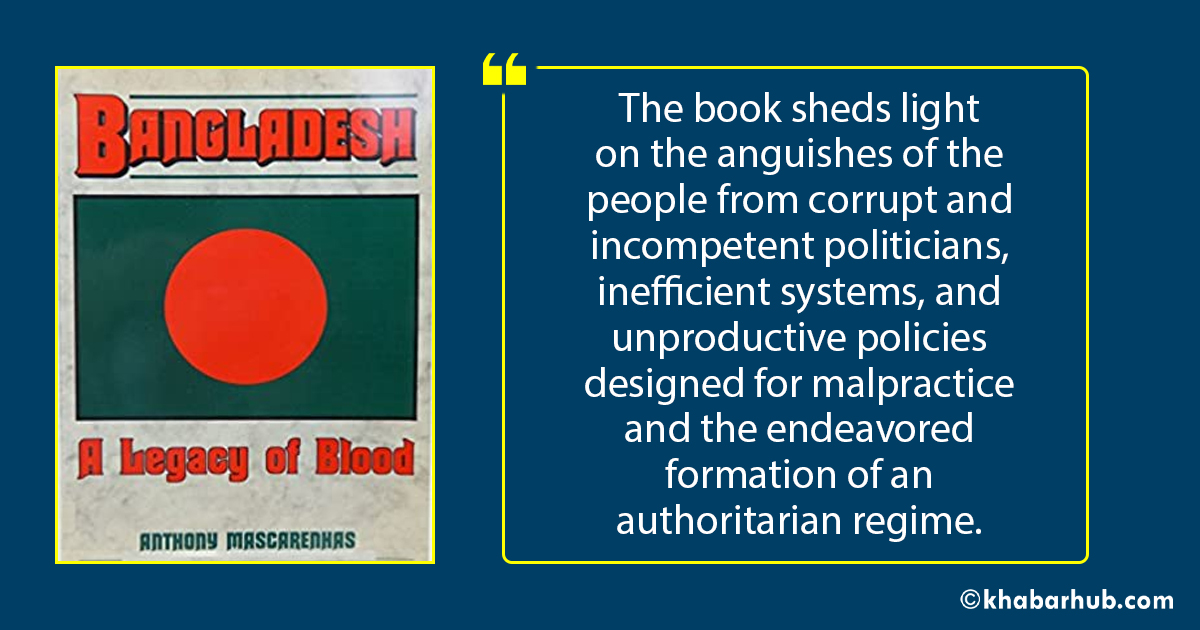Bangladesh: A Legacy of Blood by Anthony Mascarenhas, a veteran journalist, allied with Bangladesh from the start of its struggle for freedom, is historical nonfiction that incorporates the accounts of bloodshed, treacheries, Coup d’états, extrajudicial killings in the post-independence Bangladesh.
With its first edition published in the year 1986, by Hodder and Stoughton based in Great Britain, there may be an earlier printing of the book in 1985.
Although being nonfiction, the book embraces a narrative form of storytelling as of which it attempts to unmask the assassinations of two prominent figures or architects of Bangladesh i.e. Sheikh Mujibur Rahman and Ziaur Rahman.
The Bangladeshi government honored Mascarenhas’s conferment to the nation during the 1971 Liberation War by preparing an official list of names.
It sheds the light on the anguishes of the general public from corrupt and incompetent politicians, inefficient systems, and unproductive policies designed for malpractice and the endeavored formation of an authoritarian regime.
His ‘The Rape of Bangladesh’ (1972) exposés on the brutality of Pakistan’s military through the 1971 independence movement of Bangladesh.
In a modest form of understanding, Bangladesh: A Legacy of Blood is a historically insightful book with notably absorbing anecdotes. It provides the readers with the background of Bangladesh after independence, the struggle of supremacy between communism and capitalism, where the vital men themselves were involved in bringing about the ferocious coups and counter-coups in the uncontrolled period after independence, and their out-of-place nationalism and greed for power.
It sheds the light on the anguishes of the general public from corrupt and incompetent politicians, inefficient systems, and unproductive policies designed for malpractice and the endeavored formation of an authoritarian regime.
Here, power became an ultimate reason behind everything; significant leaders even though did fight for the independence of their motherland, when it came to power all went wrong.
The pursuit of absolute power propagated inside the leaders while they preach (lying) the people about the establishment of democracy. Power corrupted everyone, including the father of the nation Bagabandhu.
This book has a lot to offer. The book came as a reminder of the tussle for power supremacy in George Orwell’s novella Animal Farm and also parallel to William Golding’s Lord of the Flies, the Bangla leaders institutionalized corruption for their own hunger for absolute power disregarding their own people.
The author stresses the unfortunate past about the country which could’ve been the projection of democracy, independence, economic and political sovereignty, however it was let down, deceived, abused, and inconsolable by the many heroes of its war of independence.
Assimilated in 186 pages in total, the book is written in 13 chapters and an index. In the frontal part of the book, there are assortments of black-and-white photographs portraying the exterminated Sheikh Mujibur Rahman, the exterminated General Ziaur Rahman, conspirators behind numerous coups, politicians and some photocopies of documents and an official gazette related to the many coups Bangladesh as a new nation has grieved.
The author mentions about this book being the sad history of the first 10 years of Bangladesh based on his close personal knowledge of the main protagonists; on more than 120 separate interviews with the men and women involved in the dramatic events, and on official archives and documents which he got to inspect personally.
Anthony Mascarenhas in this book has presented the history sounds bit opinionated at times as he seems, in a way, show the plotters of the killings Major Farook Rahman and Major Khandaker Abdur Rashid in a slightly positive light.
The book reveals the brutal murder of Sheikh Mujibur Rahman and his family members which remained unpunished for 39 years along with the 20th attempted coups during Zia’s regime that killed him.
The coups, assassinations and their plotters have been presented in great detail.
Bangladesh: A Legacy of Blood is an extreme and stirring historical journey. The book engrosses its readers with brilliant writing and breath-stopping suspense till the end. For the ones trying to comprehend with the history of Bangladesh which was turned into the hideous, shameless, and parasitic.
This book has a lot to offer. The book came as a reminder of the tussle for power supremacy in George Orwell’s novella Animal Farm and also parallel to William Golding’s Lord of the Flies, the Bangla leaders institutionalized corruption for their own hunger for absolute power disregarding their own people.
Anthony Mascarenhas in this book has presented the history sounds bit opinionated at times as he seems, in a way, show the plotters of the killings Major Farook Rahman and Major Khandaker Abdur Rashid in a slightly positive light.
(The writer is Research Associate at NIICE)









Comment